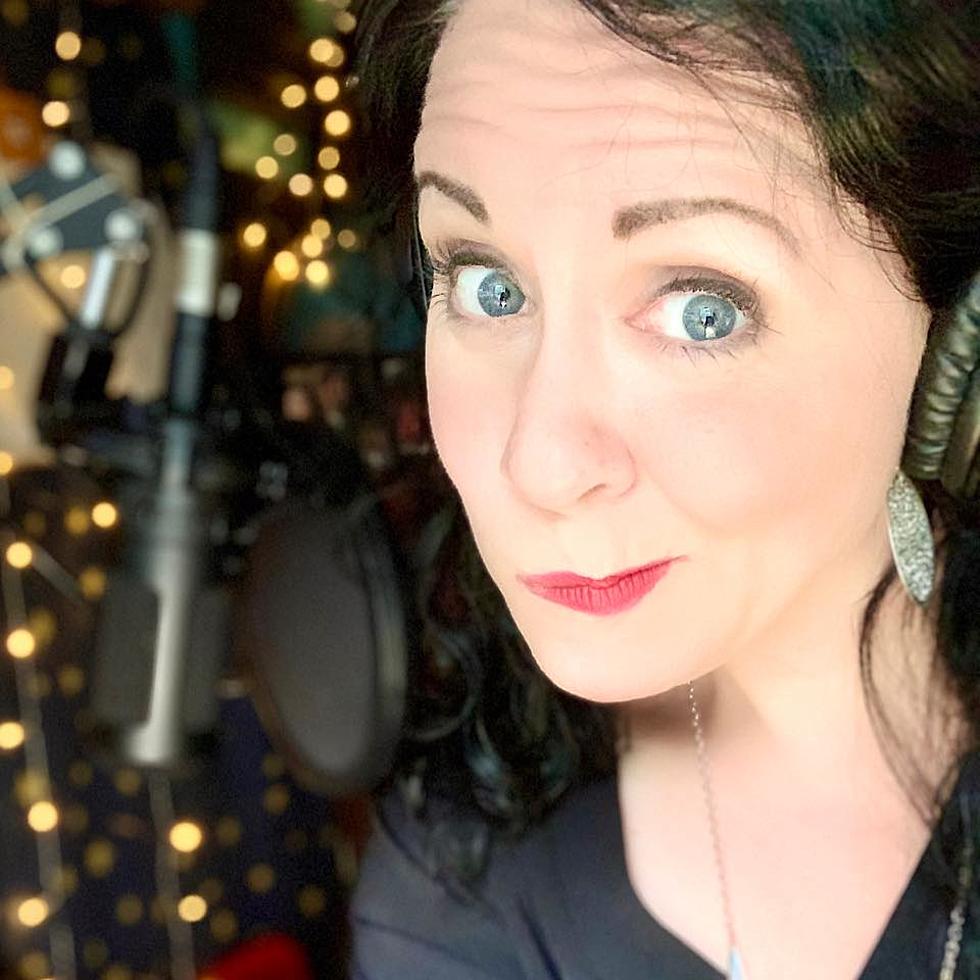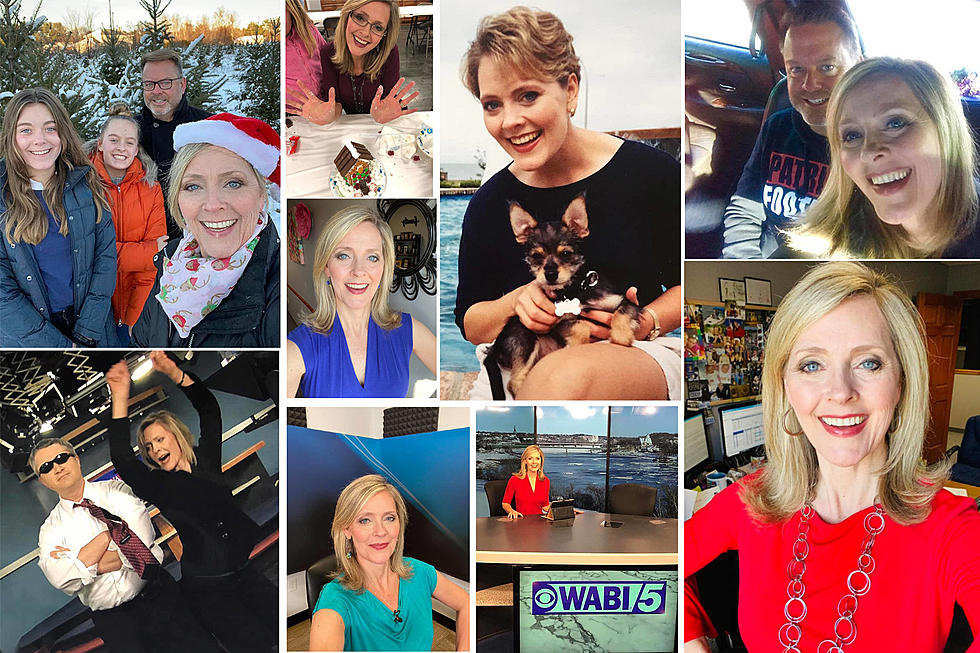
How Bangor’s Female Broadcasters Paved The Way For Women Like Me
Disclaimer: I have been fortunate to have crossed paths with many amazing women during my 25+ years working in television and radio. While I have only highlighted a handful of local women in this article, countless others have contributed to getting me here, to where I am today. To all of them, I am forever grateful and indebted for the examples they set, the battles they fought, and the extended hands they offered to help lift me, throughout my career. Thank you, ladies. Love, Cori
Here are just a few examples, on this International Women's Day, of how local female broadcasters helped pave the way for women like me to do what we do.
In the beginning:
For as far back as I can remember, I have loved doing 2 things more than anything in the world: listening to music and telling stories.
If there was an opportunity for me to be on stage, in front of an audience when I was a kid, I would be delighted to be sharing time with people.
As such, it was only natural that I gravitated towards the performing arts and broadcasting at a young age.
I remember listening to the radio as a kid and hearing female deejays like Sky Taylor introduce songs and tell stories, and somewhere in the back of my mind I thought "Maybe I could do the same thing one day!"
During High School and College, I studied Film, Television, and Theater.
Through my studies and my experience, even though it was the late 90s/early 2000s (which I thought was a pretty progressive time to be a young woman growing up), both the broadcast and the entertainment industries were very much still a "boys' club." Men occupied most of the decision-making positions and were often in roles as anchors or leads in the industry, with women cast mostly as accessories or in supportive jobs.
First stop, TV.
It wasn't until I started working in television at WLBZ 2, back home in Bangor after college, that I came across a very unique and incredibly powerful example of what females in broadcasting could do if given the opportunity.
It came in the form of the first-of-a-kind (at least for that time and in this market) all-female co-anchor situation.
Veteran broadcasters Donna Gormely and Jan Smith were an amazing team to watch. They co-anchored the evening newscast for WLBZ 2 while I worked there.
Both very smart, independent, and incredibly capable women in their own right, I watched those two work as a team, and take impressive command of the local news scene both on and off the camera. They were both beautiful, no doubt, but they were also both respected for the talent they brought to the table; way more than just a pair of pretty faces.
I was an entry-level associate producer, tasked with doing things like editing video and running scripts from place to place. I happened to be working at WLBZ 2 during the Presidential Election of 2000 (think Florida recount and hanging chads) and Y2K.
It was not an easy time to be in broadcast news. The stress was high. The stakes were high. The world felt like it was on edge.
Most other stations up and down the dial had men with suits and ties and furrowed brows delivering the news to the masses. But our station had 2 women at the helm...
I watched as these two women handled the stress with grace and finesse, commanded attention with amazing confidence but never arrogance, and delivered the news to an audience hungry for information and guidance in a way that left people comforted, and cared for but also feeling up-to-date and informed.
It was badass.
They set the bar very high for me as a young wannabe broadcaster. And what I didn't realize at the time, but would come to serve me years later, I watched both those women slay at their jobs while raising young kids in the process.
More on that in a minute.
At one point in my career, I also had the pleasure of working with some amazing women at WABI TV 5.
I was familiar with the names Sharon Pelletier and Catherine Pegram from watching the news myself. When I got a job working with them, as a young reporter, I quickly learned again some important lessons from these seasoned veterans of broadcast news.
To be in the public eye in front of the camera was new to me. I had never had to deal with the scrutiny of being judged on my appearance rather than what I produced when I worked in the background, as an associate producer. Being on the air, the judgment was different. Some of the feedback was kind. Some of it was not so kind. And some of it was downright gross.
Pelletier and Pegram handled themselves with such class and grace. In a business that can make most who work in it feel cynical and at times beaten down, these two women held their heads up high but also showed so much compassion and dedication to their craft. They did not let the outside influences become distractions from the job they were there to do.
What was also eye-opening for me was learning how to handle becoming visibly pregnant for all to see on camera, an experience Sharon and I and eventually Catherine all shared, as we all went through our first pregnancies at around the same time, and all on the air.
When people invite you into their home via television or radio, they sometimes believe it gives them the right to chime in with their two cents on every aspect of your life, even your growing belly. Watching the calm and classy way Sharon and Catherine handled those comments, an experience men in the industry would never be subjected to in the same way, was an education in setting boundaries and keeping focused.
One of the only female photojournalists I have ever encountered, Suzanne Guiggey was truly a pioneer in the field. While I was a reporter with TV 5, when we were out in the field working on a story, 99% of the photographers in the Bangor market were men.
Suzanne was the only woman schlepping around the heavy equipment, getting down into the dirt to get the good shots, and editing the stories together under the intense news deadlines.
Suz, as we called her, was younger than I was, but so good at her job, and just an overall great human, that she became a woman I looked up to greatly and who inspired me to try to learn more about things I had only ever seen the guys in the business do.
At one point during my television career, the decision was made (for budget purposes everywhere) to phase out the idea of one reporter working with one photographer, as a team. They created positions called a "one-man-band: a single person who would interview, write, shoot and edit his/her own stories.
Fellow reporter, Jodi Hersey, was someone who acclimated to this in such an impressive way.
I found that often, for one reason or another, women were not trained as frequently on how to use things like massive cameras or editing equipment. (Remember Suzanne was the only female photographer in the business at that time.)
Jodi, who is still working in the biz, has been an amazing example of embracing those challenges, learning from them, and flourishing with those new skills.
From television to radio.
After my stint in television, I was hired into radio (I'm still not entirely sure how that happened as I did not feel remotely qualified for the gig.)
On my first day at the station, I noticed that while there were several women on the sales floor as account executives, when I got up to where the studios were there were only a few female deejays.
One of those was my new boss, Allison Bankston.
Allison had already had a lengthy career as a television reporter. She not only took a chance on a young, very green broadcaster, but she graciously and even eagerly took it upon herself to share the knowledge she had learned, especially the technical knowledge of how to run all of the equipment. That is something some of the men in this industry have not been eager to do.
Dorian Daniels was working at what was then WEZQ playing Adult Contemporary Music.
Her studio was very near to the studio I was working in, so I would often hear her on the air and off the air. I would listen to her delivery and her interactions with callers. She made everything sound so natural and easy. On my best day, it was all I could do to not sound like I'd just eaten a spoonful of peanut butter. I'd hear Dorian and think "How in the world does she do that?!"
Often, I would hear male callers call in to her studio. The kind and gracious way in which she would either steer the conversation back to an appropriate place if they started to get saucy with her, or just straight up end it, but without being rude was impressive.
Cindy Campbell worked in the other studio nearby. It's safe to say, that Cindy has also had similar encounters because of all the women working in radio at this point, I think Cindy's been doing it the longest.
To say Cindy has seen and heard some things would be a gross understatement. If anyone knows what it is to battle for your footing in an industry full of men, it would be Cindy Campbell. Cindy has been through it all, with co-workers, listeners, and even artists during her tenure at Q106.5.
As Allison and Dorian were happy to help pass along what they knew to me, Cindy has also been a mentor. One of the biggest lessons Cindy has taught me is the art of being adaptable.
When she started in the business there were carts and reel-to-reel machines. Then things changed to CDs, and then to digital files. Each time something changes, Cindy has managed to learn the skills needed to excel in her field. And that's impressive.
Now, I say all of this with the caveat that Bangor seems to be a bit of an anomaly, as far as radio markets are concerned, about how they treat women.
I have worked in other, bigger cities and sadly, I have not found those experiences to always be positive ones.
One man I met with about a potential job when I moved to Arizona, tried to suggest that I would be better suited to work at Hooters than apply to an on-air position at a radio station in Tucson.
I had a superior once tell me, when I worked in Charleston, SC, that I should skip getting ice cream because he didn't want "his morning-show girl getting chubby."
Thankfully, here in Bangor, I have not had such outrageous experiences. I'd say working in my home state has given me hope, as I've personally come across less of that chauvinism. I know it exists, but less so perhaps than in other places.
When it comes to putting someone in a lead position on the air here in Bangor, I was very surprised when early on in my time in radio, I was moved up to a morning show position. Instead of basing a show around a male lead and having me work a supporting role, management allowed me the opportunity to work as an equal. That's not something that's done in some other markets. For example, at one point we hired a man from Florida to be my co-host. He ended up moving after one month because he thought I had too much of a role on the show and was intimidated. He said he was expecting me to sit and laugh at all of his jokes because that's usually what women do on morning shows.
But I have also been lucky to work alongside men who have looked beyond gender to just the basics of what makes for good, entertaining conversation.
My first co-host, John Easton, could have cared less how many times each of us spoke. All he cared about was having as much fun on the air as we could. It didn't matter to him who took the lead.
Many of the men (at least on the air) in Bangor recognize the benefits of having different perspectives and experiences to draw from and don't view my being a female as a threat or as a weak link.
With my current co-host, JStew, we use our differences to cast a wider net, so we can connect with a greater number of listeners. And that's what it should be about. It makes doing what we do much more fun and much more comfortable.
You can tell these men have had strong women in their lives. It shows through the respect they have for the women working around them.
I appreciate that immensely, as outside of work, that respect and appreciation is what I'm trying to teach my own son...
...and my daughters to have.
I am grateful that because of the strong, talented, and incredible women who came before me, like the women I've mentioned above, (but also many more whom I've not named) my kids get to see their mom do what she loves.
My youngest daughter wants to be a deejay when she grows up, like her mom.
When I was her age there were 3 women in local radio that I could name...and one nationally (Delilah.) That was it.
Fingers crossed she'll have many more examples to learn from by the time she's old enough to give it a try herself.
Cori's Radio Adventure
More From WWMJ Ellsworth Maine









